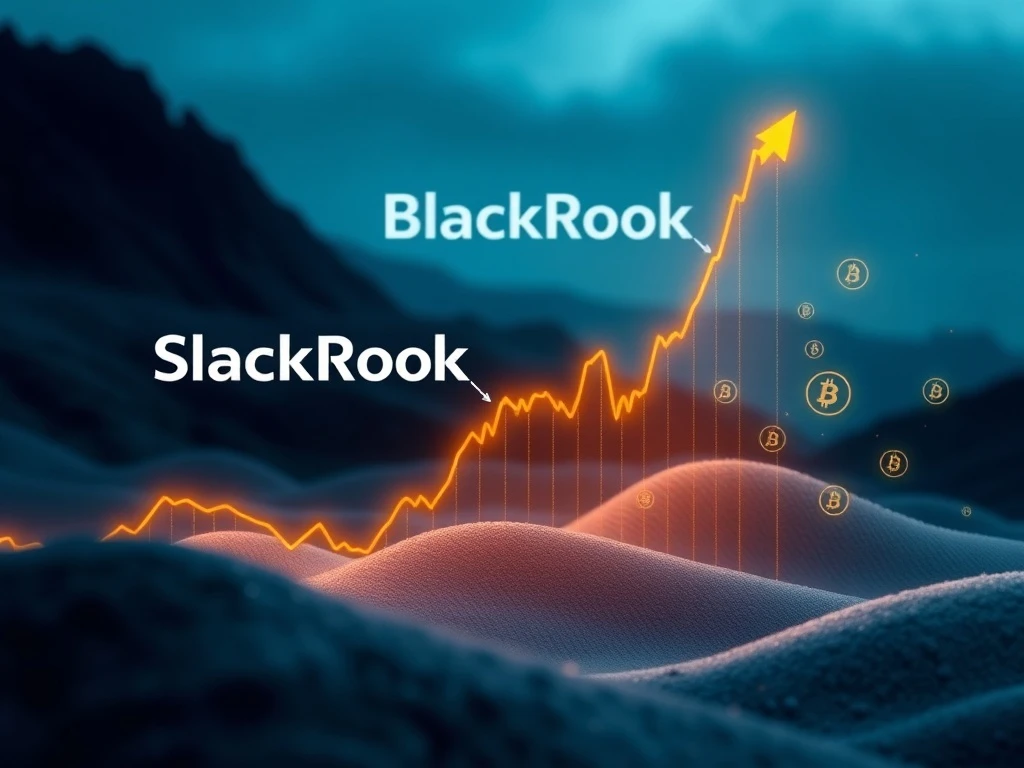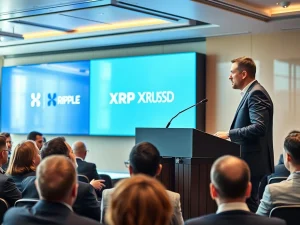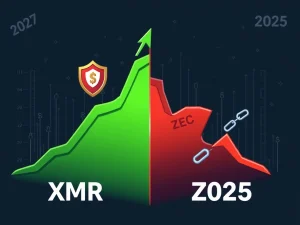Unstoppable Ascent: BlackRock’s Bitcoin ETF Eclipses S&P 500 ETF Amidst Explosive Crypto Demand

The financial world is witnessing a remarkable shift. For decades, the S&P 500 has been the undisputed champion of traditional investment benchmarks. But today, a new contender is not just entering the ring, it’s making a profound statement. BlackRock’s iShares Bitcoin Trust (IBIT), a groundbreaking Bitcoin ETF, has achieved an astonishing milestone: it’s now generating more annual fees than BlackRock’s venerable S&P 500 ETF. This isn’t just a headline; it’s a clear signal of exploding crypto demand and a new era for Bitcoin investment.
The Astonishing Rise of BlackRock IBIT: A Game Changer?
In a move that has sent ripples across financial markets, BlackRock’s iShares Bitcoin Trust (IBIT) has reportedly generated a staggering $187.2 million in annual fees. This impressive figure isn’t just significant on its own; it remarkably surpasses the revenue brought in by BlackRock’s own S&P 500 ETF. This achievement highlights a monumental surge in investor interest for regulated exposure to the world’s leading cryptocurrency.
- Record-Breaking Growth: Launched in 2023, IBIT quickly amassed $24.1 billion in net assets during Q2 2025, cementing its status as one of BlackRock’s fastest-growing ETFs.
- Massive Holdings: The fund’s Bitcoin holdings rapidly exceeded 700,000 BTC, coinciding with Bitcoin’s price surge to an impressive $118,000 and a market capitalization exceeding $2.3 trillion.
- Higher Expense Ratios: A key factor in IBIT’s fee generation is its higher expense ratio compared to traditional equity ETFs, which investors appear willing to pay for unique digital asset exposure.
Why is Bitcoin ETF Demand Surging?
The meteoric rise of the Bitcoin ETF, particularly BlackRock IBIT, isn’t a random event. It’s a direct consequence of several powerful forces converging in the investment landscape:
- Regulated Access: For years, institutional investors and even many retail investors shied away from direct Bitcoin ownership due to perceived complexities, security concerns, and regulatory uncertainties. ETFs like IBIT provide a familiar, regulated, and accessible gateway to Bitcoin exposure through traditional brokerage accounts.
- Institutional Adoption: Major financial players, including BlackRock itself, are increasingly recognizing Bitcoin’s legitimacy as an asset class. Their endorsement and product offerings lend significant credibility, attracting a broader pool of capital. BlackRock’s allocation of $71 billion to Bitcoin further underscores this trend.
- Inflation Hedge & Diversification: In an uncertain macroeconomic environment, many investors view Bitcoin as a potential hedge against inflation or a valuable diversifier for traditional portfolios, especially as yield environments remain constrained.
Nate Geraci, President of NovaDius Wealth Management, aptly summarized this shift: “This overtake is reflective of both the surging investor demand for Bitcoin and the significant fee compression in core equity exposure.” He added that investors are clearly willing to pay a premium for exposures they see as truly additive to their portfolios.
Bitcoin Investment: A New Benchmark for Portfolios?
The success of IBIT challenges the long-held dominance of traditional benchmarks. While the S&P 500 ETF remains a cornerstone for U.S. equities, representing a diversified portfolio of large-cap companies, the narrative is evolving. The flow of capital into Bitcoin-focused products suggests a growing belief that Bitcoin investment is not just a speculative play but a legitimate component of a diversified portfolio.
This isn’t to say the S&P 500 is obsolete. It continues to post modest gains and remains a critical barometer for the broader economy. However, the period saw a “pause” in activity for traditional equities as capital sought out alternatives like Bitcoin, underscoring a strategic reallocation by investors seeking different growth vectors and risk profiles.
S&P 500 ETF vs. The Digital Frontier: A Shifting Landscape
The comparison between BlackRock’s Bitcoin ETF and its S&P 500 ETF isn’t about one replacing the other, but rather about a significant expansion of the investment universe. The rapid adoption of Bitcoin ETFs signals a broader acceptance of cryptocurrencies, particularly among institutional players who once viewed them with skepticism. This dynamic creates a more complex and diversified financial ecosystem.
Here’s a quick look at the contrasting dynamics:
| Metric | iShares Bitcoin Trust (IBIT) | BlackRock S&P 500 ETF (Hypothetical Comparison) |
|---|---|---|
| Annual Fees Generated | $187.2 Million (Surpassing S&P 500 ETF) | Lower than IBIT (Due to fee compression) |
| Net Assets (Q2 2025) | $24.1 Billion | Significantly larger, but slower growth rate |
| Underlying Asset | Bitcoin (Digital Asset) | Stocks of 500 Large U.S. Companies |
| Growth Potential | High-growth, volatile | Steady, diversified, less volatile |
However, market observers emphasize that the long-term success of Bitcoin ETFs hinges on sustained Bitcoin price stability, favorable macroeconomic conditions, and continued regulatory clarity. The digital asset space is still evolving, and while demand is undeniable, it’s crucial for investors to remain informed about potential risks and market dynamics.
Conclusion: The Dawn of a Hybrid Financial Future
BlackRock’s Bitcoin ETF achieving this fee milestone is more than just a statistical anomaly; it’s a testament to the maturation of the cryptocurrency market and the increasing comfort of institutional and retail investors with digital assets. This moment signals a powerful convergence where traditional financial giants like BlackRock are not just acknowledging, but actively facilitating, the integration of cryptocurrencies into mainstream portfolios. As the lines between traditional and digital finance continue to blur, investors now have more diverse and accessible avenues than ever to navigate the evolving landscape, with Bitcoin increasingly viewed as a core component rather than a fringe asset.
Frequently Asked Questions (FAQs)
Q1: What is the iShares Bitcoin Trust (IBIT)?
A1: The iShares Bitcoin Trust (IBIT) is an Exchange Traded Fund (ETF) launched by BlackRock that allows investors to gain exposure to Bitcoin’s price movements without directly owning the cryptocurrency. It holds actual Bitcoin, and its shares trade on traditional stock exchanges.
Q2: Why are BlackRock’s Bitcoin ETF fees higher than its S&P 500 ETF?
A2: Bitcoin ETFs typically have higher expense ratios compared to established equity ETFs like those tracking the S&P 500. This is due to factors such as the novelty of the product, the specialized custody and security requirements for digital assets, and the high demand for this type of regulated exposure, which allows issuers to charge a premium.
Q3: What does IBIT surpassing the S&P 500 ETF in fees mean for traditional investments?
A3: This milestone signifies a growing acceptance and demand for digital assets within mainstream finance. While the S&P 500 remains a critical benchmark, it suggests that a portion of investor capital is actively seeking alternative, high-growth opportunities like Bitcoin, leading to a potential reallocation of funds across the broader market. It indicates a diversification of investment strategies rather than an outright replacement of traditional assets.
Q4: Is Bitcoin now considered a mainstream investment?
A4: The rapid adoption and success of Bitcoin ETFs, particularly those from major asset managers like BlackRock, strongly indicate Bitcoin’s move towards mainstream acceptance. Its integration into regulated financial products makes it accessible to a wider investor base, including institutions, further solidifying its legitimacy as a viable asset class.
Q5: What are the risks associated with Bitcoin ETFs?
A5: While Bitcoin ETFs offer regulated exposure, they are still subject to the inherent volatility of Bitcoin’s price. Other risks include regulatory changes, cybersecurity threats to the underlying assets (though mitigated by institutional custody), and broader macroeconomic conditions that can impact investor sentiment towards riskier assets.
Q6: How much Bitcoin does IBIT hold?
A6: As reported, the iShares Bitcoin Trust (IBIT) rapidly accumulated over 700,000 BTC within a record timeframe, making it one of the largest holders of Bitcoin among the newly launched ETFs.










